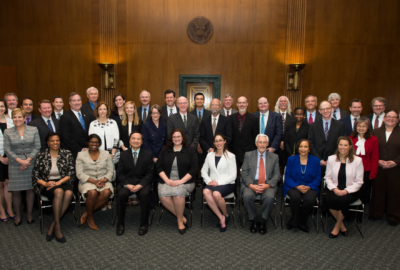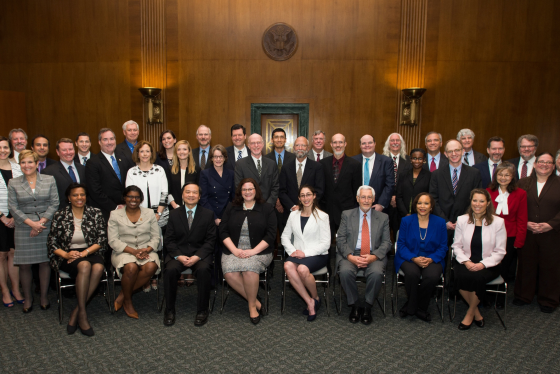
ICE team targets fugitive human rights violators in US
It's the job of Ajay Bhatt, associate legal adviser to U.S. Immigration and Customs Enforcement, to track down scores of human rights violators who've entered the...

The federal government is determined that violators of human rights find no safe haven in the U.S. But finding and repatriating them to their country of origin is a complicated and time consuming process.
That’s why U.S. Immigration and Customs Enforcement employs people like Ajay Bhatt, an associate legal adviser. He led Operation No Safe Haven in 2014 and 2015, capturing almost 70 fugitives in total.
Because of this achievement, the Partnership for Public Service recently named Bhatt one of the finalists for the 2016 Service to America Medals, which recognizes outstanding public service.
“Our program looks at individuals who have committed human rights abuses overseas in all the various countries, individuals who may have committed torture, extra-judicial killing, extreme violations of religious freedom,” Bhatt told Federal Drive with Tom Temin.
These individuals are still entitled to due process, legal representation and appeals. And most comply with the judgment rendered, Bhatt said, and report peaceably to be removed from the country. But he said a small segment of the population flees. And that’s when the Operation No Safe Haven team goes to work.
“Once they have a final order of removal that’s been adjudicated all the way through the courts, and they’ve received complete due process, we would have the opportunity to effectuate No Safe Haven and remove these individuals to their country of origin overseas,” Bhatt said.
He said the team consists primarily of analysts who work closely with law enforcement and other agencies to track these fugitives down. The team uses data like license plates and real estate information to establish a location. Team members also work closely with other agencies and organizations, like the ICE Human Rights Violators and War Crimes Center.
They also act on tips from a number of outside organizations, like the Department of Justice, the U.S. Citizenship and Immigration Services, and the non-governmental organization community.
Once they’ve located a fugitive, that’s when the difficult work begins.
“We really have to have agreement by the other country. Sometimes that’s a negotiation that can take quite some time,” Bhatt said. “We simply cannot ship them back unless we have what’s called an identity document and travel document. … But we actually have to negotiate their removal to that other country.”
Bhatt said that sometimes those negotiations can be complicated, especially when the negotiations involve more than one case.
“Some countries are very comfortable working with the U.S. and we have a great bilateral relationship with them,” Bhatt said. “Other countries are less comfortable with trying to let us repatriate one of their own citizens or nationals.”
Bhatt said the whole process, from the beginning of the investigation to the endpoint of repatriation, can take years.
That’s why they also have a team trying to vet individuals who immigrate, in order to prevent them from entering the country and establishing a foothold in the first place. The team cross-references names of immigrants against names of people known to be involved with certain regimes, and determine whether they ever committed human rights violations.
Bhatt said the actual number of absconders in the U.S. is never a stable number, as law enforcement collars some fugitives, while others flee after their judgments.
“The actual numbers in terms of absconders is always changing,” Bhatt said. “We’re constantly removing individuals all the time, and so each year we’re vetting the numbers that we have, versus the number of people that are not removed. In absentia is fluctuating number.”
Copyright © 2025 Federal News Network. All rights reserved. This website is not intended for users located within the European Economic Area.
Daisy Thornton is Federal News Network’s digital managing editor. In addition to her editing responsibilities, she covers federal management, workforce and technology issues. She is also the commentary editor; email her your letters to the editor and pitches for contributed bylines.
Follow @dthorntonWFED





